牛津译林版七年级下册期末总复习Units5-8知识点课件(共47张PPT)
文档属性
| 名称 | 牛津译林版七年级下册期末总复习Units5-8知识点课件(共47张PPT) |  | |
| 格式 | pptx | ||
| 文件大小 | 3.8MB | ||
| 资源类型 | 教案 | ||
| 版本资源 | 牛津译林版 | ||
| 科目 | 英语 | ||
| 更新时间 | 2022-06-10 08:09:41 | ||
图片预览

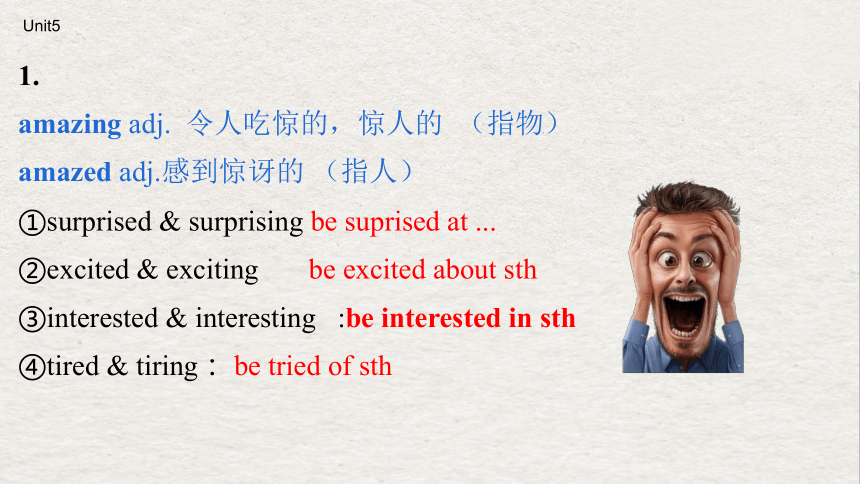
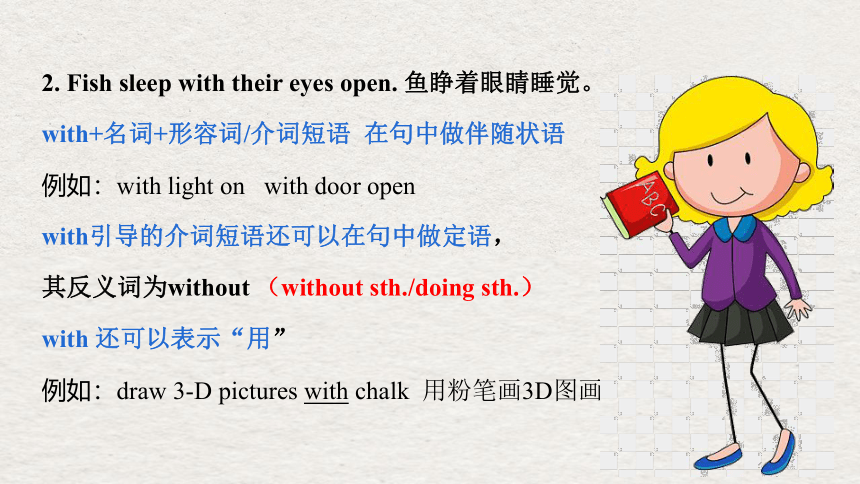
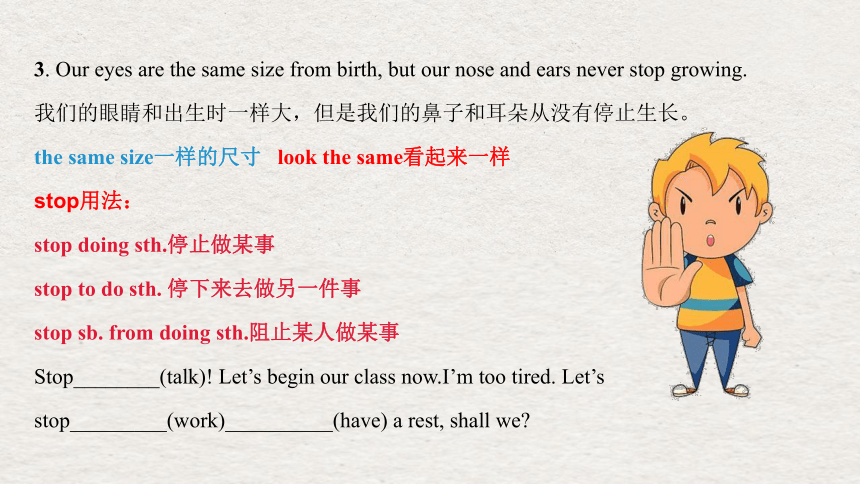
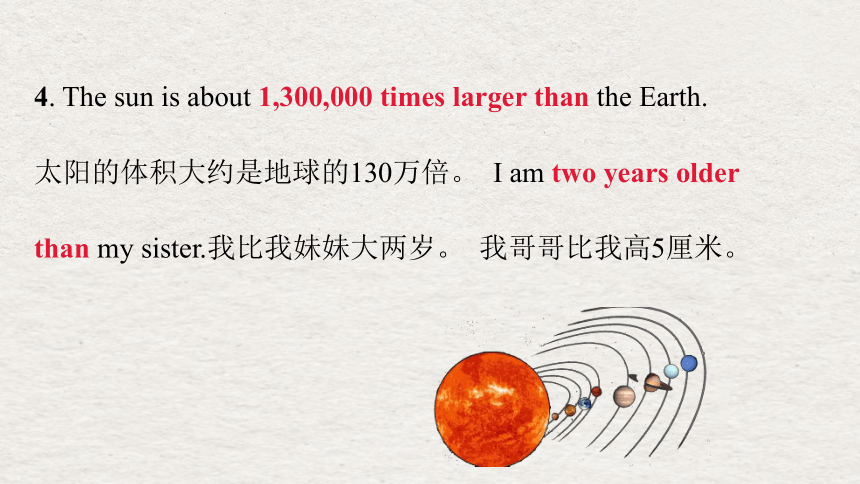
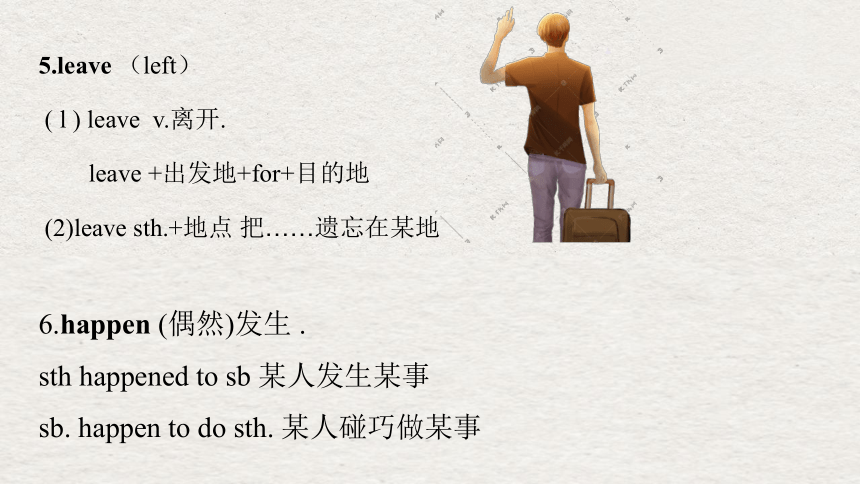
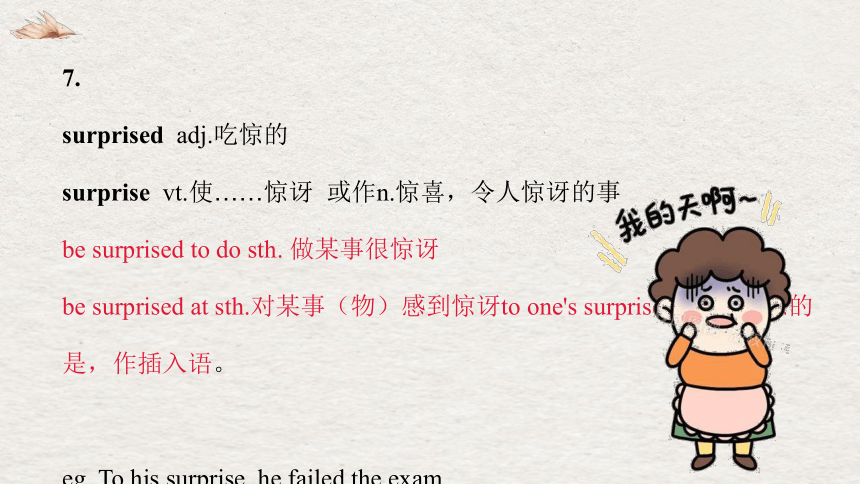
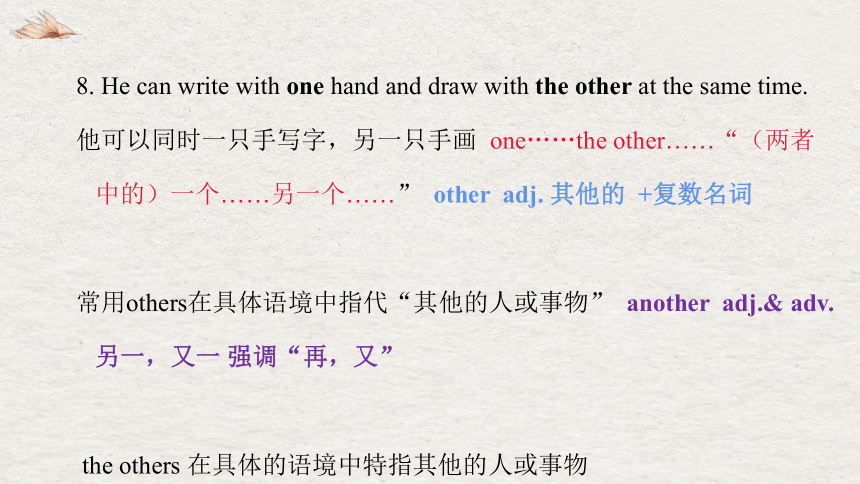
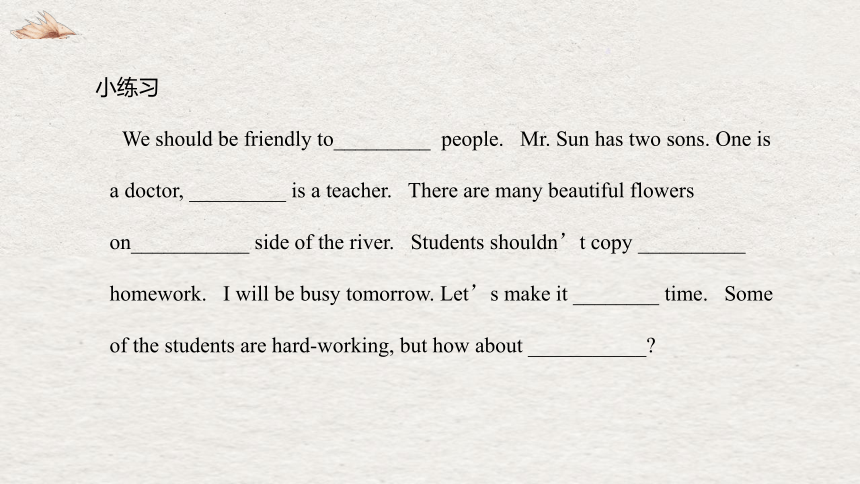
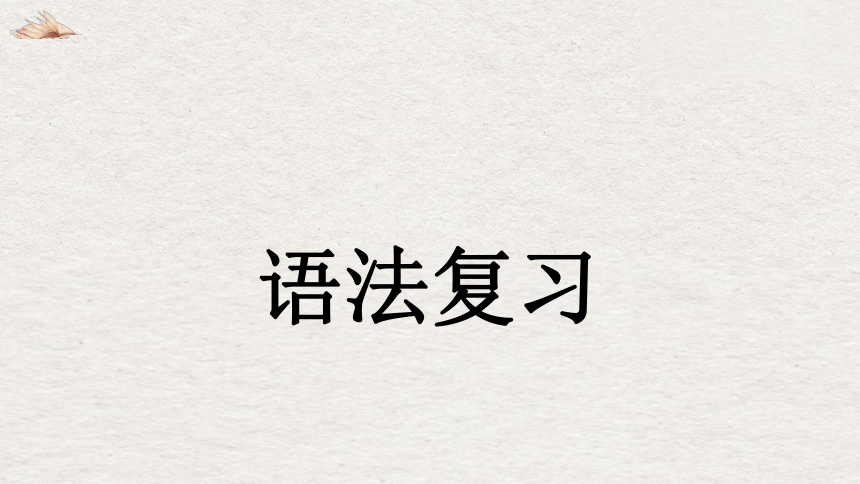
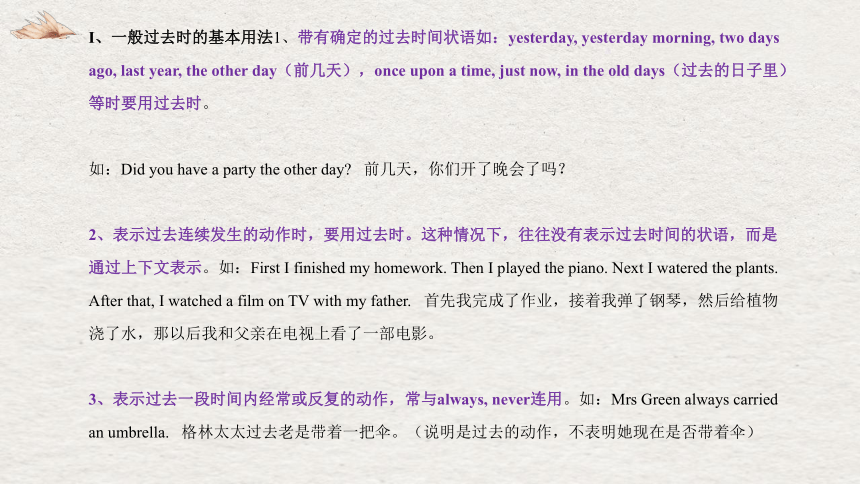
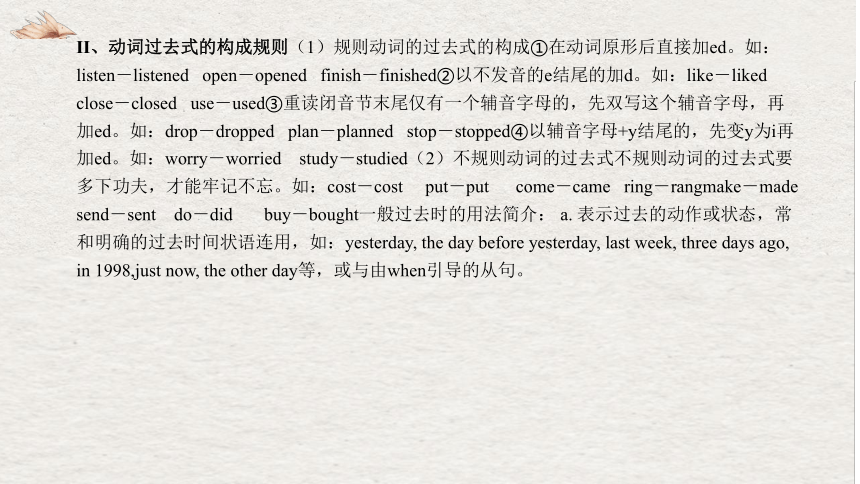
文档简介
(共47张PPT)
期末总复习Unit5-8
七年下册
Unit5
1.
amazing adj. 令人吃惊的,惊人的 (指物)
amazed adj.感到惊讶的 (指人)
①surprised & surprising be suprised at ...
②excited & exciting be excited about sth
③interested & interesting :be interested in sth
④tired & tiring :be tried of sth
2. Fish sleep with their eyes open. 鱼睁着眼睛睡觉。
with+名词+形容词/介词短语 在句中做伴随状语
例如:with light on with door open
with引导的介词短语还可以在句中做定语,
其反义词为without (without sth./doing sth.)
with 还可以表示“用”
例如:draw 3-D pictures with chalk 用粉笔画3D图画
3. Our eyes are the same size from birth, but our nose and ears never stop growing.
我们的眼睛和出生时一样大,但是我们的鼻子和耳朵从没有停止生长。
the same size一样的尺寸 look the same看起来一样
stop用法:
stop doing sth.停止做某事
stop to do sth. 停下来去做另一件事
stop sb. from doing sth.阻止某人做某事
Stop________(talk)! Let’s begin our class now.I’m too tired. Let’s stop_________(work)__________(have) a rest, shall we
4. The sun is about 1,300,000 times larger than the Earth.
太阳的体积大约是地球的130万倍。 I am two years older than my sister.我比我妹妹大两岁。 我哥哥比我高5厘米。
5.leave (left)
( l ) leave v.离开.
leave +出发地+for+目的地
(2)leave sth.+地点 把……遗忘在某地
6.happen (偶然)发生 .
sth happened to sb 某人发生某事
sb. happen to do sth. 某人碰巧做某事
7.
surprised adj.吃惊的
surprise vt.使……惊讶 或作n.惊喜,令人惊讶的事
be surprised to do sth. 做某事很惊讶
be surprised at sth.对某事(物)感到惊讶to one's surprise使某人吃惊的是,作插入语。
eg. To his surprise, he failed the exam.
8. He can write with one hand and draw with the other at the same time.
他可以同时一只手写字,另一只手画 one……the other……“(两者中的)一个……另一个……” other adj. 其他的 +复数名词
常用others在具体语境中指代“其他的人或事物” another adj.& adv. 另一,又一 强调“再,又”
the others 在具体的语境中特指其他的人或事物
小练习
We should be friendly to_________ people. Mr. Sun has two sons. One is a doctor, _________ is a teacher. There are many beautiful flowers on___________ side of the river. Students shouldn’t copy __________ homework. I will be busy tomorrow. Let’s make it ________ time. Some of the students are hard-working, but how about ___________
语法复习
I、一般过去时的基本用法1、带有确定的过去时间状语如:yesterday, yesterday morning, two days ago, last year, the other day(前几天),once upon a time, just now, in the old days(过去的日子里)等时要用过去时。
如:Did you have a party the other day 前几天,你们开了晚会了吗?
2、表示过去连续发生的动作时,要用过去时。这种情况下,往往没有表示过去时间的状语,而是通过上下文表示。如:First I finished my homework. Then I played the piano. Next I watered the plants. After that, I watched a film on TV with my father. 首先我完成了作业,接着我弹了钢琴,然后给植物浇了水,那以后我和父亲在电视上看了一部电影。
3、表示过去一段时间内经常或反复的动作,常与always, never连用。如:Mrs Green always carried an umbrella. 格林太太过去老是带着一把伞。(说明是过去的动作,不表明她现在是否带着伞)
II、动词过去式的构成规则(1)规则动词的过去式的构成①在动词原形后直接加ed。如:listen―listened open―opened finish―finished②以不发音的e结尾的加d。如:like―liked close―closed use―used③重读闭音节末尾仅有一个辅音字母的,先双写这个辅音字母,再加ed。如:drop―dropped plan―planned stop―stopped④以辅音字母+y结尾的,先变y为i再加ed。如:worry―worried study―studied(2)不规则动词的过去式不规则动词的过去式要多下功夫,才能牢记不忘。如:cost―cost put―put come―came ring―rangmake―made send―sent do―did buy―bought一般过去时的用法简介: a. 表示过去的动作或状态,常和明确的过去时间状语连用,如:yesterday, the day before yesterday, last week, three days ago, in 1998,just now, the other day等,或与由when引导的从句。
Unit6
1、Hurry up, Eddie. 快点,埃迪!
hurry up意为“快点”。
如:Hurry up, or you will be late. 快些,不然要迟到了。
(1)hurry to +地点 意为“赶往某地”,
如:Betty hurried to the garden. 贝蒂急忙奔向花园。
(2)(be)in a hurry意为“匆忙地;仓促地”.
(3)hurry to do sth. 急忙做某事
2、Hobo, carry it for me. 霍波,帮我拿包吧。[辩异]bring, carry 和take
bring表示“拿来”(从远到近)
take表示“拿走”(从近到远)
carry表示“搬、运”____________ me my food here, please. You can read the book here but you can’t ______ it home.Trains _______ more things than trucks.
3、You complain too much. 你抱怨太多了。
complain to sb. about sth.向某人抱怨某事He complained______the teachers.
He complained_______ his child’s bad grades.
too much “太多”修饰不可数名词或修饰动词表程度 too many “太多” 修饰名词复数
much too “太” 修饰形容词或副词 You shouldn’t eat _______ meat. I’m afraid you eat _________. Jim put _________ books into his schoolbag, so it is ______ heavy now.
4、It took a watch out of its pocket and looked at the time.
它从口袋里拿出一块表看了看时间。
take A out of B意为“从B物品中拿出A”。
make A out of B意为“用B物品制作A物品”
5、Alice fell for a long time, and then she hit the ground.爱丽丝掉了很长一段时间,接着她撞到了地面。fall 作动词,意为“倒下;跌下;落下”,其过去式为fell。如:Jack fell into the water and got wet. 杰克掉进水里,全身都湿透了。
fall down 倒下;落下
fall asleep 入睡fall off……从……掉下
fall behind 落后;落在……的后面(2)hit作动词,意为“打;敲;撞;击中”。过去式hit.
hit sb in the face/on the head意为“打某人的脸/头”,
如:Simon hit Jack in the face. 西蒙打了杰克的脸。
6、She found herself alone in a long, low hall.
她发现她自己单独在一个长的低矮的大厅里。
(1)alone用作形容词,意为“单独的”,只作表语。如:Robinson was alone on the island. 罗宾逊一人在岛上。
(2)alone用作副词,意为“单独地;独自”。
=by oneself或on one’s own
如:The old woman lived alone in the mountain village. 这位老妇单独一人住在那个山村。
lonely 只作adj.孤独的,寂寞的,强调内心感受。eg. The old woman doesn’t feel _______although she lives__________.
7、Alice tried to go through the door, but she was too big. try to do sth. 努力做某事
try doing sth.尝试做某事try on 试穿
have a try 试一下try/do one’s best to do sth. 尽某人最大的努力去做某事
重点探究
8、He practised playing volleyball with his friends. 他和他的朋友练习打排球。
practise sth./doing sth.
eg. practise basketball = practise playing basketballWe should practise ___________English every day.
我们应该每天训练说英语。
重点探究
9、We put up a tent near a lake. 我在湖旁搭起了帐蓬。(put过去式put)
(1)put 动词,意为“放;置”。如:Please put your shoes under the bed. 请把鞋放在床下。
(2)put up 意为“举起;建起;住宿”如:Those who want to see the film put up your hands. 想看电影的人,请举手。10、Weifang, a city in Shandong Province, has become famous for making kites from then on. 潍坊-山东省的一个城市,从那时起因制造风筝变得出名了。
from then on 意为“从那时起”,与一般过去时连用from now on 意为“从现在起” 与一般将来时连用
语法复习
重点探究
一般过去时(II)I一般过去时的句型见下表:
动词种类 句型 例句
to be 肯定句:主语+ be的过去式(was, were). . . I was very tried last night. 我昨天晚上很累。
否定句:主语+ be的过去式(was, were)+ not . . . I wasn’t busy the other day. 前几天我不忙。
疑问句:be的过去式(was, were)+主语+ . . . ―Was your mother free this morning ―今天上午你妈妈有空吗?―Yes, she was./No she wasn’t ―是的,她有空。/不,她没有空。
to do 肯定句:主语+ 动词的过去式+ . . . She studied Russian two years ago. 她两年前学过俄语。
否定句:主语+ did not + 动词原形+ . . . He didn’t have classes this morning. 他今天上午没课。
疑问句:Did + 主语+ 动词原形+ . . . ―Did he go there ―他去那里了吗?―Yes, he did./No, he didn’t. ―是的,他去了。/不,他没有去。
重点探究
II.与一般过去时经常搭配的时间状语有:yesterday 或由其构成的短语。如:yesterday morning, the day before yesterday等。2、由last开头构成的短语。如:last year, last month等。3、由ago结尾构成的短语。如:a moment ago, an hour ago等。4、由“介词+过去时间”构成的短语。如:in 2002, at the time等。5、this week, this year, today等也可与一般过去时连用,但它们必须指过去,决不包括“现在”在内。6、其他词。如:then, just now, once等。此外,也可以根据上下文或语境所暗示的时间来判断出一般过去时。如:I saw him in the street.
Unit7
重点探究
1、Believe it or not! 信不信由你!
belive/think后可接that引导的宾语从句,当主语为第一人称,后接否定意义的宾语从句时,需要否定前移。
eg. 我认为他不会通过考试。
正:I don’t think/believe that he can pass the exam.
误:I think/believe that he can’t pass the exam.
2、We can send some books to them. 我们可以给他们送些书。(过去式sent) send用作及物动词,意为“寄(信等);发(电报);(派人)送”。 send sb. sth.= send sth. to sb. (give/show/lend/pass传递) borrow sth. from sb.
buy sb sth.= buy sth. for sb.拓展: ①send up 发射
②send for (派人去)请来
3、Some children are not even able to pay for school.
一些孩子甚至不能付上学的钱。
able形容词,意为“有能力的;能干的”。
如:Your father is an able man.
be able to 能;会 。相当于can/could,但be able to 有一般将来时。
sb. pay (sb.) for sth. 某人付给(某人)钱买某物 过去式paidsb. spend +时间/金钱(in)doing sth./ on(doing) sth. 某人花费时间、金钱做某事。It takes sb. some time to do sth. 做某事花费了某人多长时间。sth. cost sb.+ 金钱 某物花了某人多少钱
4、He was brave enough to save his neighbour from a fire. 他足够勇敢将他的邻居从火中救了出来。save 动词,意为“救;求助”,
save . . . from意为“从……中救出……”。
save还有“节省,节约;储蓄,保存”的意思。5、He was in hospital for two weeks. 他在医院住了两个星期。in hospital意思是“生病住院”,
而in the hospital意思为“在医院里”。
6、Keep your hair away from fire. 让头发要远离火。词组
keep . . . away from sth表示“(使)不靠近或远离……”的意思。
如:Keep the children away from the water. It’s dangerous.
不要让儿童靠近水。危险!
7、When he is free, he often helps at the Helping Hands Club and does most of the computer work for the club. 当他有空时,他常常在帮手俱乐部帮忙解决大多数电脑问题。 when/while引导时间状语从句,
如果主句是一般将来时,when引导的句子用一般现在时表示一般将来时,
if引导的条件状语从句,主句用一般将来时,从句用一般现在时。 When you________(come) here tomorrow, can you bring me some fruit If it ________(not rain) tomorrow, we will go boating on the lake.
8、We look forward to hearing from you soon.
我们期待很快收到你的来信。
hear from sb.(宾) 意为“收到某人的来信”write (a letter) to sb. 给某人写信
9.He is a member of our Project Hope and often takes part in activities like collecting clothes and books for children in need.
他是我们希望工程的一名成员,经常参加一些为有需要的孩子筹集衣物和书本的活动。 be a member of…… 是……的一名成员
take part in ……参加(活动)
join 参加(组织,群体)
in (great) need of sth. (急)需要某物
10. protect +宾+from/against…… 保护……不受……
语法复习
I、情态动词can, could的用法(1)can的用法can表示某人具有某种能力,意思为“能,会”,也表示客观的可能性,是“能够,可能”的意思。后接动词原形,适用于所有人称。(2)could的用法could为can的过去式,表示“能,可以”,另外could可用来代替can,表示更为客气委婉的语气,用来提出要求,但回答时不能用could,而要用can. Could you swim when you were young No, I couldn’t. (问能力) Could I smoke here No, you can’t. (表示委婉的请求)其他回答:Go ahead./Help yourself./No problem./You’d better not./I’m afraid you can’t.
II、感叹句的用法感叹句用来表示强烈的感情,能表达愤怒、悲哀、惊奇、厌恶和赞赏等。 句末用感叹号“!”,读时用降调。在口语中常用省略句,后面的主语和谓语往往省略,有时只用一个词或词组表达。(1)以what开头的感叹句,what作定语,修饰名词(名词前可有其他定语),可数名词单数形式前要加不定冠词a(an)。
句型:What (a/an)+adj.+n.(+s+v)!
如:What a clever boy(he is )! 多么聪明的孩子!(2)以how开头的感叹句,how作状语,修饰形容词、副词或动词。
句型:How +adj./adv.(+s+v)!如:How blue the sky is ! 天空多么蓝啊!(3)疑问句形式的感叹句:有些感叹句采用一般疑问句的形式表示,以否定词开头,在口语中读降调 如:Isn’t it a lovely view ! 多美的景色呀!
Unit8
1、I can feed her carrots. 我能喂胡萝卜给她吃. (过去式fed)句中feed的意思是“喂养,给予食物”。
常见的短语有
feed something to . . . (把……喂给……),
feed on . . .(以……为食)
eg. Cats feed on fish. 猫以鱼为食。
2、He’d never bark or bite, and he doesn’t like to fight.
它从不叫,也不咬人,也不喜欢打斗。fight(fought) with sb. 和某人打架
have a fight with sb.
3、I will look after him until the end. 我将照顾他一直到最后。 look after ……well=take good care of…… 照顾好……句中until的意思是“直到……时候”,相当于till,但until比till更加正式,until多用于句首。not . . . till/until . . . 直到……才……She didn’t hear from her son till last Friday. 直到上星期五他才接到儿子的信。
3、Goldfish are quiet and easy to look after.
金鱼很安静且容易照料。“主语 + be + adj. to do”结构是英语中的一个重要句式,当这一句式里的主语是后面不定式的逻辑宾语时,
它有一个同义句式:It + be + adj. + to do sth.
如:English is easy to learn. = It is easy to learn English. 英语很好学。The text is easy to understand. = It is easy to understand the text.
这课文很好理解。
4、A goldfish weighs about 40 grams. 一条金鱼重约40克。weigh动词,意为“重;承重;称……的重量”。
weigh up to 重达……weight名词,意为“体重;重量”。如:What’s the weight of the watermelon(西瓜) 这些西瓜多重?
语法复习
I、形容词形容词是用来修饰名词和代词,表示人和或事物的性质、特征、状态或属性的词。
如:tired, boring, busy, beautiful, easy, difficult, exciting等。1、形容词描述事物,作为修饰词,形容词常常放在名词前。adj.+n. 形容词修饰名词。如:It was a windy day. 那是一个有风的天。Can you hear a strange noise 你能听到一个奇怪的声音吗?2、形容词描述事物,和系动词一起用,形容词常常放在系动词后,系动词+ adj.
形容词作表语 英语中的常见的连系动词有:be, become, feel, get, grow, keep, look, seem, smell, sound, taste, turn 等。口诀:一be, 二保持keep, stay三变become, turn get, 五感官look, smell, feel,sound, taste, 等。如:She is honest and helpful. 她诚实而又乐于助人。The garden looks so beautiful. 花园看起来很美。The plan sounds good. 这个计划听起来很好。[拓展]多个形容词修饰名词时,其顺序为:限定词、数词、描绘词(大小,长短,形状,新旧,颜色)、出处、材料性质、类别、名词。如:a famous French medical school
an expensive German sports car
II、不定代词1、someone/somebody, anyone/anybody, no one/nobody都是指代人的不定代词,当我们不确定所谈论的人的名字或者不需要提及他/她的名字时,就可以用这些不定代词指代。① someone/somebody可以用来表示:“一个未指明的或未知的”人,常用于肯定句。如:Somebody gave you a ticket for the pop concert. 有人给了你一张流行音乐会的门票。②anyone/anybody可以表示“任何人”或“不确定的某个人”。当表达第一种意思时,可用于肯定句;第二种意思意思则用于疑问句和否定句。如:Anyone will tell you where the post office is. 谁都会告诉你邮局在哪儿。(任何一个人)③no one/nobody意为“没有人;没有任何人”。no one常用于书面语,nobody在口语中常用。如:Nobody knew what to do. 谁也不知道该做什么。④someone/somebody, anyone/anybody 和 no one/nobody都具有单数含义,因此后面要接单数谓语动词。如:Someone is waiting for you in the playground. 有人在操场上等你。⑤它们可以有所有格形式,指代某个人所拥有的东西,相应的代词一般也用单数。如:I don’t want to waste anyone’s time. 我不想浪费任何人的时间。
2、something, anything, nothing① something, anything, nothing常指代物,代表我们不确定某样东西或我们不需要提及名字的某样东西。②something用来表示“一个未指明的或未知的物”,常用于肯定句。如:Something is better than nothing. 有总比没有好。③anything可以表示“任何东西/事情”或“不一定是哪一件东西/事情”。当表达第一种意思时,可用于肯定句;第二种意思则用于疑问句和否定句。如:Is there anything in the bag 袋子里有东西吗?④nothing表示否定含义。如:I’ve got nothing to say. 我没有什么话可以说。⑤形容词修饰不定代词时常位于其后,作后置定语。如:We’re looking for someone special. 我们在寻找一个特殊的人。⑥一般来说,something用于肯定句,anything用于否定句和疑问句:但在问话人认为对方确实需要某物或该做某事而希望得到肯定答复时,在问句中用something。如:Can you do something for me I really need your help. 你能为我做件事吗?我真的需要你的帮助。(某件很确定的事,而且希望对方能答应)Have you got anything interesting 你有没有什么有趣的东西?(任何有趣的东西,而且不确定对方会有什么样的答复)
Thank you
七年级英语下册课件
期末总复习Unit5-8
七年下册
Unit5
1.
amazing adj. 令人吃惊的,惊人的 (指物)
amazed adj.感到惊讶的 (指人)
①surprised & surprising be suprised at ...
②excited & exciting be excited about sth
③interested & interesting :be interested in sth
④tired & tiring :be tried of sth
2. Fish sleep with their eyes open. 鱼睁着眼睛睡觉。
with+名词+形容词/介词短语 在句中做伴随状语
例如:with light on with door open
with引导的介词短语还可以在句中做定语,
其反义词为without (without sth./doing sth.)
with 还可以表示“用”
例如:draw 3-D pictures with chalk 用粉笔画3D图画
3. Our eyes are the same size from birth, but our nose and ears never stop growing.
我们的眼睛和出生时一样大,但是我们的鼻子和耳朵从没有停止生长。
the same size一样的尺寸 look the same看起来一样
stop用法:
stop doing sth.停止做某事
stop to do sth. 停下来去做另一件事
stop sb. from doing sth.阻止某人做某事
Stop________(talk)! Let’s begin our class now.I’m too tired. Let’s stop_________(work)__________(have) a rest, shall we
4. The sun is about 1,300,000 times larger than the Earth.
太阳的体积大约是地球的130万倍。 I am two years older than my sister.我比我妹妹大两岁。 我哥哥比我高5厘米。
5.leave (left)
( l ) leave v.离开.
leave +出发地+for+目的地
(2)leave sth.+地点 把……遗忘在某地
6.happen (偶然)发生 .
sth happened to sb 某人发生某事
sb. happen to do sth. 某人碰巧做某事
7.
surprised adj.吃惊的
surprise vt.使……惊讶 或作n.惊喜,令人惊讶的事
be surprised to do sth. 做某事很惊讶
be surprised at sth.对某事(物)感到惊讶to one's surprise使某人吃惊的是,作插入语。
eg. To his surprise, he failed the exam.
8. He can write with one hand and draw with the other at the same time.
他可以同时一只手写字,另一只手画 one……the other……“(两者中的)一个……另一个……” other adj. 其他的 +复数名词
常用others在具体语境中指代“其他的人或事物” another adj.& adv. 另一,又一 强调“再,又”
the others 在具体的语境中特指其他的人或事物
小练习
We should be friendly to_________ people. Mr. Sun has two sons. One is a doctor, _________ is a teacher. There are many beautiful flowers on___________ side of the river. Students shouldn’t copy __________ homework. I will be busy tomorrow. Let’s make it ________ time. Some of the students are hard-working, but how about ___________
语法复习
I、一般过去时的基本用法1、带有确定的过去时间状语如:yesterday, yesterday morning, two days ago, last year, the other day(前几天),once upon a time, just now, in the old days(过去的日子里)等时要用过去时。
如:Did you have a party the other day 前几天,你们开了晚会了吗?
2、表示过去连续发生的动作时,要用过去时。这种情况下,往往没有表示过去时间的状语,而是通过上下文表示。如:First I finished my homework. Then I played the piano. Next I watered the plants. After that, I watched a film on TV with my father. 首先我完成了作业,接着我弹了钢琴,然后给植物浇了水,那以后我和父亲在电视上看了一部电影。
3、表示过去一段时间内经常或反复的动作,常与always, never连用。如:Mrs Green always carried an umbrella. 格林太太过去老是带着一把伞。(说明是过去的动作,不表明她现在是否带着伞)
II、动词过去式的构成规则(1)规则动词的过去式的构成①在动词原形后直接加ed。如:listen―listened open―opened finish―finished②以不发音的e结尾的加d。如:like―liked close―closed use―used③重读闭音节末尾仅有一个辅音字母的,先双写这个辅音字母,再加ed。如:drop―dropped plan―planned stop―stopped④以辅音字母+y结尾的,先变y为i再加ed。如:worry―worried study―studied(2)不规则动词的过去式不规则动词的过去式要多下功夫,才能牢记不忘。如:cost―cost put―put come―came ring―rangmake―made send―sent do―did buy―bought一般过去时的用法简介: a. 表示过去的动作或状态,常和明确的过去时间状语连用,如:yesterday, the day before yesterday, last week, three days ago, in 1998,just now, the other day等,或与由when引导的从句。
Unit6
1、Hurry up, Eddie. 快点,埃迪!
hurry up意为“快点”。
如:Hurry up, or you will be late. 快些,不然要迟到了。
(1)hurry to +地点 意为“赶往某地”,
如:Betty hurried to the garden. 贝蒂急忙奔向花园。
(2)(be)in a hurry意为“匆忙地;仓促地”.
(3)hurry to do sth. 急忙做某事
2、Hobo, carry it for me. 霍波,帮我拿包吧。[辩异]bring, carry 和take
bring表示“拿来”(从远到近)
take表示“拿走”(从近到远)
carry表示“搬、运”____________ me my food here, please. You can read the book here but you can’t ______ it home.Trains _______ more things than trucks.
3、You complain too much. 你抱怨太多了。
complain to sb. about sth.向某人抱怨某事He complained______the teachers.
He complained_______ his child’s bad grades.
too much “太多”修饰不可数名词或修饰动词表程度 too many “太多” 修饰名词复数
much too “太” 修饰形容词或副词 You shouldn’t eat _______ meat. I’m afraid you eat _________. Jim put _________ books into his schoolbag, so it is ______ heavy now.
4、It took a watch out of its pocket and looked at the time.
它从口袋里拿出一块表看了看时间。
take A out of B意为“从B物品中拿出A”。
make A out of B意为“用B物品制作A物品”
5、Alice fell for a long time, and then she hit the ground.爱丽丝掉了很长一段时间,接着她撞到了地面。fall 作动词,意为“倒下;跌下;落下”,其过去式为fell。如:Jack fell into the water and got wet. 杰克掉进水里,全身都湿透了。
fall down 倒下;落下
fall asleep 入睡fall off……从……掉下
fall behind 落后;落在……的后面(2)hit作动词,意为“打;敲;撞;击中”。过去式hit.
hit sb in the face/on the head意为“打某人的脸/头”,
如:Simon hit Jack in the face. 西蒙打了杰克的脸。
6、She found herself alone in a long, low hall.
她发现她自己单独在一个长的低矮的大厅里。
(1)alone用作形容词,意为“单独的”,只作表语。如:Robinson was alone on the island. 罗宾逊一人在岛上。
(2)alone用作副词,意为“单独地;独自”。
=by oneself或on one’s own
如:The old woman lived alone in the mountain village. 这位老妇单独一人住在那个山村。
lonely 只作adj.孤独的,寂寞的,强调内心感受。eg. The old woman doesn’t feel _______although she lives__________.
7、Alice tried to go through the door, but she was too big. try to do sth. 努力做某事
try doing sth.尝试做某事try on 试穿
have a try 试一下try/do one’s best to do sth. 尽某人最大的努力去做某事
重点探究
8、He practised playing volleyball with his friends. 他和他的朋友练习打排球。
practise sth./doing sth.
eg. practise basketball = practise playing basketballWe should practise ___________English every day.
我们应该每天训练说英语。
重点探究
9、We put up a tent near a lake. 我在湖旁搭起了帐蓬。(put过去式put)
(1)put 动词,意为“放;置”。如:Please put your shoes under the bed. 请把鞋放在床下。
(2)put up 意为“举起;建起;住宿”如:Those who want to see the film put up your hands. 想看电影的人,请举手。10、Weifang, a city in Shandong Province, has become famous for making kites from then on. 潍坊-山东省的一个城市,从那时起因制造风筝变得出名了。
from then on 意为“从那时起”,与一般过去时连用from now on 意为“从现在起” 与一般将来时连用
语法复习
重点探究
一般过去时(II)I一般过去时的句型见下表:
动词种类 句型 例句
to be 肯定句:主语+ be的过去式(was, were). . . I was very tried last night. 我昨天晚上很累。
否定句:主语+ be的过去式(was, were)+ not . . . I wasn’t busy the other day. 前几天我不忙。
疑问句:be的过去式(was, were)+主语+ . . . ―Was your mother free this morning ―今天上午你妈妈有空吗?―Yes, she was./No she wasn’t ―是的,她有空。/不,她没有空。
to do 肯定句:主语+ 动词的过去式+ . . . She studied Russian two years ago. 她两年前学过俄语。
否定句:主语+ did not + 动词原形+ . . . He didn’t have classes this morning. 他今天上午没课。
疑问句:Did + 主语+ 动词原形+ . . . ―Did he go there ―他去那里了吗?―Yes, he did./No, he didn’t. ―是的,他去了。/不,他没有去。
重点探究
II.与一般过去时经常搭配的时间状语有:yesterday 或由其构成的短语。如:yesterday morning, the day before yesterday等。2、由last开头构成的短语。如:last year, last month等。3、由ago结尾构成的短语。如:a moment ago, an hour ago等。4、由“介词+过去时间”构成的短语。如:in 2002, at the time等。5、this week, this year, today等也可与一般过去时连用,但它们必须指过去,决不包括“现在”在内。6、其他词。如:then, just now, once等。此外,也可以根据上下文或语境所暗示的时间来判断出一般过去时。如:I saw him in the street.
Unit7
重点探究
1、Believe it or not! 信不信由你!
belive/think后可接that引导的宾语从句,当主语为第一人称,后接否定意义的宾语从句时,需要否定前移。
eg. 我认为他不会通过考试。
正:I don’t think/believe that he can pass the exam.
误:I think/believe that he can’t pass the exam.
2、We can send some books to them. 我们可以给他们送些书。(过去式sent) send用作及物动词,意为“寄(信等);发(电报);(派人)送”。 send sb. sth.= send sth. to sb. (give/show/lend/pass传递) borrow sth. from sb.
buy sb sth.= buy sth. for sb.拓展: ①send up 发射
②send for (派人去)请来
3、Some children are not even able to pay for school.
一些孩子甚至不能付上学的钱。
able形容词,意为“有能力的;能干的”。
如:Your father is an able man.
be able to 能;会 。相当于can/could,但be able to 有一般将来时。
sb. pay (sb.) for sth. 某人付给(某人)钱买某物 过去式paidsb. spend +时间/金钱(in)doing sth./ on(doing) sth. 某人花费时间、金钱做某事。It takes sb. some time to do sth. 做某事花费了某人多长时间。sth. cost sb.+ 金钱 某物花了某人多少钱
4、He was brave enough to save his neighbour from a fire. 他足够勇敢将他的邻居从火中救了出来。save 动词,意为“救;求助”,
save . . . from意为“从……中救出……”。
save还有“节省,节约;储蓄,保存”的意思。5、He was in hospital for two weeks. 他在医院住了两个星期。in hospital意思是“生病住院”,
而in the hospital意思为“在医院里”。
6、Keep your hair away from fire. 让头发要远离火。词组
keep . . . away from sth表示“(使)不靠近或远离……”的意思。
如:Keep the children away from the water. It’s dangerous.
不要让儿童靠近水。危险!
7、When he is free, he often helps at the Helping Hands Club and does most of the computer work for the club. 当他有空时,他常常在帮手俱乐部帮忙解决大多数电脑问题。 when/while引导时间状语从句,
如果主句是一般将来时,when引导的句子用一般现在时表示一般将来时,
if引导的条件状语从句,主句用一般将来时,从句用一般现在时。 When you________(come) here tomorrow, can you bring me some fruit If it ________(not rain) tomorrow, we will go boating on the lake.
8、We look forward to hearing from you soon.
我们期待很快收到你的来信。
hear from sb.(宾) 意为“收到某人的来信”write (a letter) to sb. 给某人写信
9.He is a member of our Project Hope and often takes part in activities like collecting clothes and books for children in need.
他是我们希望工程的一名成员,经常参加一些为有需要的孩子筹集衣物和书本的活动。 be a member of…… 是……的一名成员
take part in ……参加(活动)
join 参加(组织,群体)
in (great) need of sth. (急)需要某物
10. protect +宾+from/against…… 保护……不受……
语法复习
I、情态动词can, could的用法(1)can的用法can表示某人具有某种能力,意思为“能,会”,也表示客观的可能性,是“能够,可能”的意思。后接动词原形,适用于所有人称。(2)could的用法could为can的过去式,表示“能,可以”,另外could可用来代替can,表示更为客气委婉的语气,用来提出要求,但回答时不能用could,而要用can. Could you swim when you were young No, I couldn’t. (问能力) Could I smoke here No, you can’t. (表示委婉的请求)其他回答:Go ahead./Help yourself./No problem./You’d better not./I’m afraid you can’t.
II、感叹句的用法感叹句用来表示强烈的感情,能表达愤怒、悲哀、惊奇、厌恶和赞赏等。 句末用感叹号“!”,读时用降调。在口语中常用省略句,后面的主语和谓语往往省略,有时只用一个词或词组表达。(1)以what开头的感叹句,what作定语,修饰名词(名词前可有其他定语),可数名词单数形式前要加不定冠词a(an)。
句型:What (a/an)+adj.+n.(+s+v)!
如:What a clever boy(he is )! 多么聪明的孩子!(2)以how开头的感叹句,how作状语,修饰形容词、副词或动词。
句型:How +adj./adv.(+s+v)!如:How blue the sky is ! 天空多么蓝啊!(3)疑问句形式的感叹句:有些感叹句采用一般疑问句的形式表示,以否定词开头,在口语中读降调 如:Isn’t it a lovely view ! 多美的景色呀!
Unit8
1、I can feed her carrots. 我能喂胡萝卜给她吃. (过去式fed)句中feed的意思是“喂养,给予食物”。
常见的短语有
feed something to . . . (把……喂给……),
feed on . . .(以……为食)
eg. Cats feed on fish. 猫以鱼为食。
2、He’d never bark or bite, and he doesn’t like to fight.
它从不叫,也不咬人,也不喜欢打斗。fight(fought) with sb. 和某人打架
have a fight with sb.
3、I will look after him until the end. 我将照顾他一直到最后。 look after ……well=take good care of…… 照顾好……句中until的意思是“直到……时候”,相当于till,但until比till更加正式,until多用于句首。not . . . till/until . . . 直到……才……She didn’t hear from her son till last Friday. 直到上星期五他才接到儿子的信。
3、Goldfish are quiet and easy to look after.
金鱼很安静且容易照料。“主语 + be + adj. to do”结构是英语中的一个重要句式,当这一句式里的主语是后面不定式的逻辑宾语时,
它有一个同义句式:It + be + adj. + to do sth.
如:English is easy to learn. = It is easy to learn English. 英语很好学。The text is easy to understand. = It is easy to understand the text.
这课文很好理解。
4、A goldfish weighs about 40 grams. 一条金鱼重约40克。weigh动词,意为“重;承重;称……的重量”。
weigh up to 重达……weight名词,意为“体重;重量”。如:What’s the weight of the watermelon(西瓜) 这些西瓜多重?
语法复习
I、形容词形容词是用来修饰名词和代词,表示人和或事物的性质、特征、状态或属性的词。
如:tired, boring, busy, beautiful, easy, difficult, exciting等。1、形容词描述事物,作为修饰词,形容词常常放在名词前。adj.+n. 形容词修饰名词。如:It was a windy day. 那是一个有风的天。Can you hear a strange noise 你能听到一个奇怪的声音吗?2、形容词描述事物,和系动词一起用,形容词常常放在系动词后,系动词+ adj.
形容词作表语 英语中的常见的连系动词有:be, become, feel, get, grow, keep, look, seem, smell, sound, taste, turn 等。口诀:一be, 二保持keep, stay三变become, turn get, 五感官look, smell, feel,sound, taste, 等。如:She is honest and helpful. 她诚实而又乐于助人。The garden looks so beautiful. 花园看起来很美。The plan sounds good. 这个计划听起来很好。[拓展]多个形容词修饰名词时,其顺序为:限定词、数词、描绘词(大小,长短,形状,新旧,颜色)、出处、材料性质、类别、名词。如:a famous French medical school
an expensive German sports car
II、不定代词1、someone/somebody, anyone/anybody, no one/nobody都是指代人的不定代词,当我们不确定所谈论的人的名字或者不需要提及他/她的名字时,就可以用这些不定代词指代。① someone/somebody可以用来表示:“一个未指明的或未知的”人,常用于肯定句。如:Somebody gave you a ticket for the pop concert. 有人给了你一张流行音乐会的门票。②anyone/anybody可以表示“任何人”或“不确定的某个人”。当表达第一种意思时,可用于肯定句;第二种意思意思则用于疑问句和否定句。如:Anyone will tell you where the post office is. 谁都会告诉你邮局在哪儿。(任何一个人)③no one/nobody意为“没有人;没有任何人”。no one常用于书面语,nobody在口语中常用。如:Nobody knew what to do. 谁也不知道该做什么。④someone/somebody, anyone/anybody 和 no one/nobody都具有单数含义,因此后面要接单数谓语动词。如:Someone is waiting for you in the playground. 有人在操场上等你。⑤它们可以有所有格形式,指代某个人所拥有的东西,相应的代词一般也用单数。如:I don’t want to waste anyone’s time. 我不想浪费任何人的时间。
2、something, anything, nothing① something, anything, nothing常指代物,代表我们不确定某样东西或我们不需要提及名字的某样东西。②something用来表示“一个未指明的或未知的物”,常用于肯定句。如:Something is better than nothing. 有总比没有好。③anything可以表示“任何东西/事情”或“不一定是哪一件东西/事情”。当表达第一种意思时,可用于肯定句;第二种意思则用于疑问句和否定句。如:Is there anything in the bag 袋子里有东西吗?④nothing表示否定含义。如:I’ve got nothing to say. 我没有什么话可以说。⑤形容词修饰不定代词时常位于其后,作后置定语。如:We’re looking for someone special. 我们在寻找一个特殊的人。⑥一般来说,something用于肯定句,anything用于否定句和疑问句:但在问话人认为对方确实需要某物或该做某事而希望得到肯定答复时,在问句中用something。如:Can you do something for me I really need your help. 你能为我做件事吗?我真的需要你的帮助。(某件很确定的事,而且希望对方能答应)Have you got anything interesting 你有没有什么有趣的东西?(任何有趣的东西,而且不确定对方会有什么样的答复)
Thank you
七年级英语下册课件
同课章节目录
